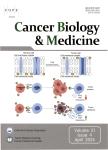Oncoprotein HBXIP promotes tumorigenesis through MAPK/ERK pathway activation in non-small cell lung cancer
Oncoprotein HBXIP promotes tumorigenesis through MAPK/ERK pathway activation in non-small cell lung cancer作者机构:Department of Breast CancerKey Laboratory of Breast Cancer Prevention and TherapyTianjin Medical University Cancer Institute and HospitalNational Clinical Research Center for CancerKey Laboratory of Cancer Prevention and TherapyTianjinTianjin’s Clinical Research Center for CancerTianjin 300060China Department of Outpatient OfficeTianjin Medical University Cancer Institute and HospitalNational Clinical Research Center for CancerKey Laboratory of Cancer Prevention and TherapyTianjinTianjin’s Clinical Research Center for CancerTianjin 300060China Department of Thyroid and Neck TumorTianjin Medical University Cancer Institute and HospitalNational Clinical Research Center for CancerKey Laboratory of Cancer Prevention and TherapyTianjinTianjin’s Clinical Research Center for CancerTianjin 300060China Department of LymphomaTianjin Medical University Cancer Institute and HospitalNational Clinical Research Center for CancerKey Laboratory of Cancer Prevention and TherapyTianjinTianjin’s Clinical Research Center for CancerTianjin 300060China
出 版 物:《Cancer Biology & Medicine》 (癌症生物学与医学(英文版))
年 卷 期:2021年第18卷第1期
页 面:105-119页
核心收录:
学科分类:1002[医学-临床医学] 100214[医学-肿瘤学] 10[医学]
基 金:supported by the National Natural Science Foundation of China(Grant Nos.81502322,81872169,and 81702629) the Tianjin Key Research and Development Program of Science and Technology Support Key Projects(Grant No.17YFZCSY00690) the XI SI KE--CSPC Cancer Research Fund。
主 题:HBXIP non-small cell lung cancer MEK1 tumor progression
摘 要:Objective:The oncoprotein,hepatitis B X-interacting protein(HBXIP),has been reported to play an important role in human malignancies.However,its functions in non-small cell lung cancer(NSCLC)are poorly understood.The goal of the present study was to identify the role of HBXIP in the regulation of NSCLC development.Methods:The level of HBXIP expression in NSCLC tissue was assessed by immunohistochemical and Western blot analyses,and its relationships with clinicopathological features and outcomes were statistically evaluated.The effects of HBXIP on NSCLC cell progression were assessed through cell viability,colony formation,and flow cytometry analyses in vitro.The mechanism by which HBXIP regulated the MAPK pathway was studied by Western blot,immunofluorescence,and immunoprecipitation assays.In addition,in vivo experiments were performed to evaluate the progression of NSCLC and ERK signaling pathway activation after HBXIP knockdown.Results:HBXIP was overexpressed in human NSCLC and was correlated with the invasiveness of NSCLC.The high expression of HBXIP in NSCLC was significantly correlated with gender(P=0.033),N stage(P=0.002),and tumor-node-metastasis stage(P=0.008).In vitro experiments using an NSCLC cell line revealed that HBXIP knockdown resulted in the suppression of cell proliferation and colony formation,which was consistent with the enhanced cell cycle arrest in G1 phase.The results of a mechanistic investigation suggested that binding of HBXIP to MEK1 protein promoted MAPK/ERK signaling pathway activation in NSCLC by preventing the proteasome-mediated degradation of MEK1.In addition,the results obtained using in vivo subcutaneous tumor xenografts confirmed that HBXIP deficiency decreased MEK1 protein levels and NSCLC tumor growth.Conclusions:Taken together,our results showed that the HBXIP-MEK interaction promoted oncogenesis via the MAPK/ERK pathway,which may serve as a novel therapeutic target for cancers in which MAPK/ERK signaling is a dominant feature.



